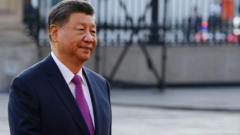The ongoing tariff conflict between China and the United States intensifies as Beijing emphasizes its determination to withstand U.S. economic pressures, leading to concerns of a prolonged trade standoff that could adversely affect both nations' economies.**
Escalation in the Trade War: China's Stance Against U.S. Tariffs Strengthens**

Escalation in the Trade War: China's Stance Against U.S. Tariffs Strengthens**
Beijing vows to resist U.S. trade pressures as both economies face potential economic downturns.**
China is showing no intentions of backing down in the ongoing tariff conflict with the United States, as it prepares to counter a potential escalation from President Donald Trump. The trade war between the two largest economies continues to intensify, with China declaring its commitment to "fight to the end" just hours after Trump threatened to raise tariffs on Chinese imports nearly twofold. Should these measures be implemented, some Chinese imports could face tariffs as high as 104%, a critical escalation that could severely impact various sectors including electronics, toys, and machinery.
With a key deadline looming as Trump threatens to enforce these additional tariffs, analysts suggest that it won't be China that yields first. "It's essential to recognize that China will not withdraw tariffs unilaterally," notes Alfredo Montufar-Helu from The Conference Board. Any retreat could be perceived as weakness, granting the U.S. further negotiating leverage. As a result, experts are increasingly concerned about the long-term economic ramifications for both countries amidst this stalemate.
Global markets have reacted negatively, with significant declines reported since the announcement of these tariffs, which impact a variety of countries. While Asian stocks saw a brief recovery, the looming situation maintains a cloud of uncertainty over the global economy. China's retaliatory measures, including levying its own tariffs of 34% on U.S. goods, have contributed to this tumultuous climate.
In light of these developments, analysis indicates that both nations must endure economic pain to maintain their national resolve. Trade experts believe this ongoing conflict may lead to a "game of mutual suffering," where both sides exhibit resilience to avoid conceding to perceived aggression from the other. Meanwhile, China's internal economic challenges, including a slowing growth rate and rising unemployment, compound the potential fallout from these tariffs, threatening to destabilize its economic framework.
The U.S., which imported $438 billion worth of goods from China, now faces the daunting task of finding alternative sources for these products, a process complicated by the extreme interdependence of the two economies. The flow of investments and digital trade between the countries complicates the tariff situation further, establishing that the impact of these tariffs could be multi-faceted and extensive.
As the world observes this rising tension, analysts remain unsure about the potential outcomes. While there are indications that private discussions might occur, skepticism lingers regarding the effectiveness of such negotiations. Concerns are heightened by the rapid escalation of tariffs and the associated risks involved in the ongoing trade war, leaving experts uncertain about the future trajectory of U.S.-China relations.
With a key deadline looming as Trump threatens to enforce these additional tariffs, analysts suggest that it won't be China that yields first. "It's essential to recognize that China will not withdraw tariffs unilaterally," notes Alfredo Montufar-Helu from The Conference Board. Any retreat could be perceived as weakness, granting the U.S. further negotiating leverage. As a result, experts are increasingly concerned about the long-term economic ramifications for both countries amidst this stalemate.
Global markets have reacted negatively, with significant declines reported since the announcement of these tariffs, which impact a variety of countries. While Asian stocks saw a brief recovery, the looming situation maintains a cloud of uncertainty over the global economy. China's retaliatory measures, including levying its own tariffs of 34% on U.S. goods, have contributed to this tumultuous climate.
In light of these developments, analysis indicates that both nations must endure economic pain to maintain their national resolve. Trade experts believe this ongoing conflict may lead to a "game of mutual suffering," where both sides exhibit resilience to avoid conceding to perceived aggression from the other. Meanwhile, China's internal economic challenges, including a slowing growth rate and rising unemployment, compound the potential fallout from these tariffs, threatening to destabilize its economic framework.
The U.S., which imported $438 billion worth of goods from China, now faces the daunting task of finding alternative sources for these products, a process complicated by the extreme interdependence of the two economies. The flow of investments and digital trade between the countries complicates the tariff situation further, establishing that the impact of these tariffs could be multi-faceted and extensive.
As the world observes this rising tension, analysts remain unsure about the potential outcomes. While there are indications that private discussions might occur, skepticism lingers regarding the effectiveness of such negotiations. Concerns are heightened by the rapid escalation of tariffs and the associated risks involved in the ongoing trade war, leaving experts uncertain about the future trajectory of U.S.-China relations.





















